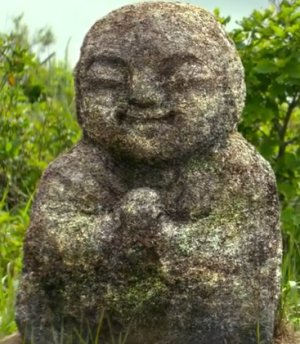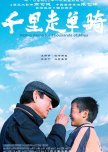Breath of Fresh Air
Filmmaker Zhang Yi Mou is best known as the director of Hero (2002), House of Flying Daggers (2004), Curse of the Golden Flower (2006) three depictions of Feudal China combining jaw-dropping cinematography and surreal choreography. In simple terms, wushu grandeur films, but he has mastered the art of filmography beyond the Wushu genre.
His films such as Raise High the Red Lanterns (1991), Coming Home (1999), Happy Times (2000), and Under the Hawthorn Tree (2010) fly under the radar regarding social issues. His experience as a cinematographer contributed to Riding Alone for Thousands of Miles the visual imagery of Japan's coast and Yunnan's mountains and terrain, the picture is, as usual, a credit to Zhang Yimou's distinctive talent. Today's audience bombarded with an onslaught of genres like ACTION, WUSHU, ADVENTURE, SCI-FI, or COMIC Book Live Adaptations diluting their appetite for Waterdown gratification.
The film tackles the estranged relationship between a father and his dying son only to encounter numerous obstacles of language, time, and governmental bureaucracy. The focal point of the story surrounding Chinese folk opera singer Li Jiamin (Jiamin Li ) who Ken Takakura's character, hoping to repair relations with his son, decides to set on a trip to China and film the singer with the help of Jasmine (Jiang Wen) and Lingo (Lin Qiu), two translators.
Ken Takakura's performance is nothing short of spectacular. Zhang's camera delineates his face with great diligence and grace in style. The range of depth emotions he pours into his character who speaks through stoic facial expressions, sullen strides, and gentle motions of the hand is a difficult task, one which Takakura—a famed Yakuza actor—undertakes with apparent ease. It is his last film. The dialogue takes a back seat to the subtle changes in the scenery. The non-actors were themselves going about life.
It is a tired formula from a brilliant director. Some of the themes he utilities journey past bureaucracy and dispassion examined in his early film The Story of Qiu Ju (1992). The tragic element within the movie beautiful, but I tend to prefer the melodrama - tragedy in Happy Times (2000). The OST is alright, but it was not the piece that catapulted the film over the top.
Sally Wen Mao's poem popped into my head while viewing this awing film cinematography by Xiaoding Zhao, who lent his cinematic expertise in Zhang's House of Flying Daggers film. This film relies heavily on contrasts - the vibrant, untouched Chinese mountains and valley against Japan's grey tone. Riding Alone for Thousands of Miles creates a story built around Gou-Ichi Takata's (Ken Takakura) search for reconnection. I thought of the poem below while riding alone in uninhabited lands or our journey of self-discovery/redemption; we come to find solace that everything we do is essential to someone.
Riding Alone for Thousands of Miles Poem
by Sally Wen Mao
“In Lijiang, the sign outside your hostel
glares: Ride alone, ride alone, ride
alone — it taunts you for the mileage
of your solitude, must be past
thousands, for you rode this plane
alone, this train alone, you'll ride
this bus alone well into the summer night,
well into the next hamlet, town,
city, the next century, as the trees twitch
and the clouds wane and the tides
quiver and the galaxies tilt and the sun
spins us another lonely cycle, you'll
wonder if this compass will ever change.
The sun doesn't need more heat,
so why should you? The trees don't need
to be close, so why should you?”
Final Rating: 8.51/10
Story: 8.24/10
Acting: 9.52/10
Rewatch Value: 7/10
It sends a great message, but I will hold off a little while I view this Lost In Translation film.
His films such as Raise High the Red Lanterns (1991), Coming Home (1999), Happy Times (2000), and Under the Hawthorn Tree (2010) fly under the radar regarding social issues. His experience as a cinematographer contributed to Riding Alone for Thousands of Miles the visual imagery of Japan's coast and Yunnan's mountains and terrain, the picture is, as usual, a credit to Zhang Yimou's distinctive talent. Today's audience bombarded with an onslaught of genres like ACTION, WUSHU, ADVENTURE, SCI-FI, or COMIC Book Live Adaptations diluting their appetite for Waterdown gratification.
The film tackles the estranged relationship between a father and his dying son only to encounter numerous obstacles of language, time, and governmental bureaucracy. The focal point of the story surrounding Chinese folk opera singer Li Jiamin (Jiamin Li ) who Ken Takakura's character, hoping to repair relations with his son, decides to set on a trip to China and film the singer with the help of Jasmine (Jiang Wen) and Lingo (Lin Qiu), two translators.
Ken Takakura's performance is nothing short of spectacular. Zhang's camera delineates his face with great diligence and grace in style. The range of depth emotions he pours into his character who speaks through stoic facial expressions, sullen strides, and gentle motions of the hand is a difficult task, one which Takakura—a famed Yakuza actor—undertakes with apparent ease. It is his last film. The dialogue takes a back seat to the subtle changes in the scenery. The non-actors were themselves going about life.
It is a tired formula from a brilliant director. Some of the themes he utilities journey past bureaucracy and dispassion examined in his early film The Story of Qiu Ju (1992). The tragic element within the movie beautiful, but I tend to prefer the melodrama - tragedy in Happy Times (2000). The OST is alright, but it was not the piece that catapulted the film over the top.
Sally Wen Mao's poem popped into my head while viewing this awing film cinematography by Xiaoding Zhao, who lent his cinematic expertise in Zhang's House of Flying Daggers film. This film relies heavily on contrasts - the vibrant, untouched Chinese mountains and valley against Japan's grey tone. Riding Alone for Thousands of Miles creates a story built around Gou-Ichi Takata's (Ken Takakura) search for reconnection. I thought of the poem below while riding alone in uninhabited lands or our journey of self-discovery/redemption; we come to find solace that everything we do is essential to someone.
Riding Alone for Thousands of Miles Poem
by Sally Wen Mao
“In Lijiang, the sign outside your hostel
glares: Ride alone, ride alone, ride
alone — it taunts you for the mileage
of your solitude, must be past
thousands, for you rode this plane
alone, this train alone, you'll ride
this bus alone well into the summer night,
well into the next hamlet, town,
city, the next century, as the trees twitch
and the clouds wane and the tides
quiver and the galaxies tilt and the sun
spins us another lonely cycle, you'll
wonder if this compass will ever change.
The sun doesn't need more heat,
so why should you? The trees don't need
to be close, so why should you?”
Final Rating: 8.51/10
Story: 8.24/10
Acting: 9.52/10
Rewatch Value: 7/10
It sends a great message, but I will hold off a little while I view this Lost In Translation film.
Was this review helpful to you?


























